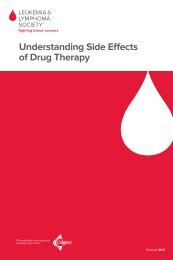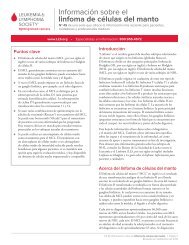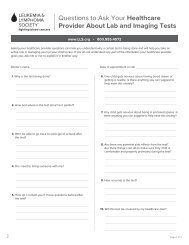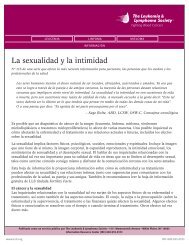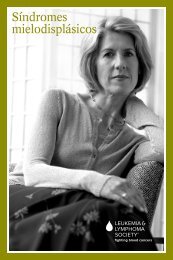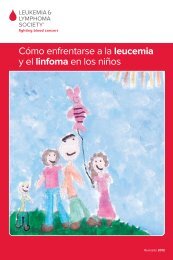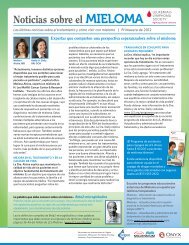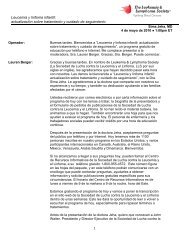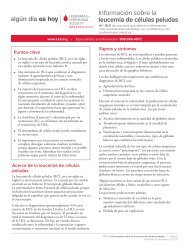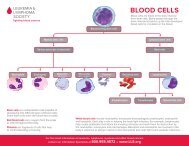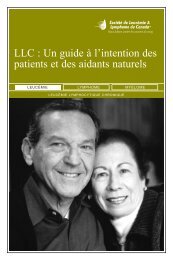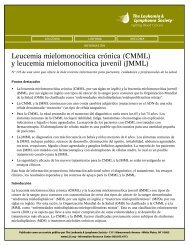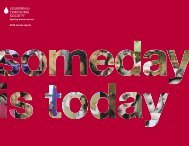Blood Transfusion (PDF) - The Leukemia & Lymphoma Society
Blood Transfusion (PDF) - The Leukemia & Lymphoma Society
Blood Transfusion (PDF) - The Leukemia & Lymphoma Society
You also want an ePaper? Increase the reach of your titles
YUMPU automatically turns print PDFs into web optimized ePapers that Google loves.
Information for Veterans. Veterans with certain blood cancer diagnoses who<br />
were exposed to Agent Orange while serving in Vietnam may be able to get help<br />
from the United States Department of Veterans Affairs. For more information<br />
call the Department of Veterans Affairs at (800) 749-8387 or visit<br />
www.publichealth.va.gov/exposures/agentorange.<br />
Depression. Treatment for depression has proven benefits for people living<br />
with cancer. Depression is an illness that should be treated even when a person is<br />
undergoing cancer treatment. Seek medical advice if your mood does not improve<br />
over time—for example, if you feel depressed every day for a two-week period.<br />
Contact LLS or ask your healthcare team for guidance and referrals to other<br />
sources of help, such as counseling services or community programs. For more<br />
information you can contact the National Institute of Mental Health (NIMH) at<br />
www.nimh.nih.gov and enter “depression” in the search box at the top of the web<br />
page, or call the NIMH toll-free at (866) 615-6464.<br />
We’d Like to Hear From You. We hope this booklet helps you. Please tell us<br />
what you think at www.LLS.org/publicationfeedback. Click on “LLS Disease &<br />
Treatment Publications—Survey for Patients, Family and Friends.”<br />
<strong>Blood</strong> Donation<br />
<strong>The</strong> need for blood transfusions for patients with blood cancers never takes a<br />
holiday. Every day thousands of blood components are transfused to patients. <strong>Blood</strong><br />
cannot be made artificially; thus, patients’ lives literally depend on volunteers who<br />
give blood on a regular basis. Volunteers have the option to donate platelets alone<br />
versus donating whole blood. As the population gets older and more sophisticated<br />
medical practices are developed, the need for blood component therapy will grow.<br />
In many areas of the country, blood centers have had difficulty keeping up with the<br />
need, and as a result there have been frequent shortages.<br />
About 60 percent of the US population is eligible to donate blood. People in good<br />
health, at least 17 years old and weighing at least 110 pounds can donate blood<br />
every two months. Family members and friends often ask what they can do to help<br />
support their loved one during his or her illness. One relatively easy and simple thing<br />
that eligible people can do is to donate blood, and encourage friends and family<br />
members to donate. Often, blood centers are able to send a card to the patient after<br />
a donation is made, to acknowledge the donor’s gift in the patient’s name. While<br />
there should be no pressure to donate, this is one altruistic and valuable contribution<br />
to the care of patients and costs the donor no money. <strong>The</strong> gift of blood donation<br />
supports all patients and families dealing with blood cancers or other diseases, for<br />
which transfusions may be an essential part of treatment, and ensures that blood will<br />
be available when it is needed.<br />
<strong>Blood</strong> <strong>Transfusion</strong> I page 3



